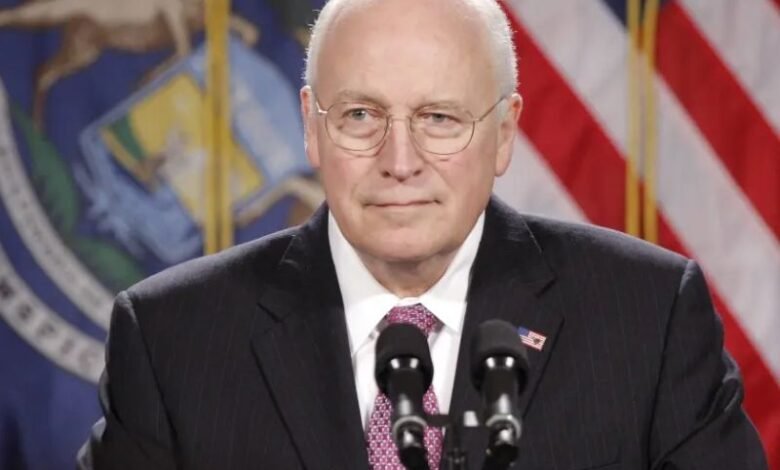Dick Cheney Net Worth: Legacy of an American Political Titan
Dick Cheney Net Worth: Legacy of an American Political Titan

Richard Bruce “Dick” Cheney is one of the most consequential and enigmatic figures in American political history. Known for his iron-willed leadership and deep influence on U.S. defense and energy policies, Cheney’s career has spanned over five decades — from his early political roles under President Ford to his transformative time as Vice President under George W. Bush.
But beyond politics, Cheney’s net worth, estimated between $100 million and $150 million, has drawn public fascination. His wealth represents the convergence of public service, private enterprise, and political power, with much of it linked to his tenure as CEO of Halliburton, a global energy conglomerate.
This article provides an in-depth examination of Dick Cheney’s net worth — exploring his career trajectory, business earnings, assets, and the role of his family in shaping his financial legacy.
Early Life and Education
Born on January 30, 1941, in Lincoln, Nebraska, Dick Cheney was raised in Casper, Wyoming, by his parents Marjorie and Richard Herbert Cheney. His family was middle-class; his father worked for the U.S. Department of Agriculture, and his mother was a homemaker with a strong sense of civic duty.
Cheney’s early education was marked by both brilliance and rebellion. He attended Yale University, but dropped out due to academic struggles, later earning both bachelor’s and master’s degrees in Political Science from the University of Wyoming. These formative years instilled in him a pragmatic worldview — one that would later guide his rise in Washington and the corporate world.
Early Career and Political Ascent
Cheney began his political career as an intern in the Nixon administration before joining Donald Rumsfeld’s team at the Office of Economic Opportunity. His talent for policy and political maneuvering soon earned him key roles in the Ford administration, where he became White House Chief of Staff in 1975.
This position placed Cheney at the center of U.S. governance during a turbulent period. Although the role wasn’t highly lucrative, it was pivotal for building connections that would define his later success. By 1977, Cheney had established himself as a political strategist with a reputation for discipline and discretion.
Congressional Career: Wyoming’s Lone Representative
In 1978, Cheney was elected to the U.S. House of Representatives for Wyoming’s at-large district. He served six consecutive terms, chairing influential committees on energy and defense.
During these years, Cheney’s annual salary as a congressman was around $60,000 to $100,000, a stable middle-class income. However, his congressional tenure helped him develop expertise in defense policy and resource management, which would later fuel his corporate ambitions.
By the time Cheney left Congress in 1989, he had built both a respected political brand and a network of contacts across defense and energy sectors — two fields that would later shape his wealth.
Secretary of Defense: From Public Service to Prominence
Appointed Secretary of Defense under President George H. W. Bush in 1989, Cheney oversaw the Gulf War (1990–1991) and major post–Cold War restructuring of the military.
Although his government salary (approximately $180,000 per year) did not make him rich, his influence grew exponentially. He earned respect from military leaders and defense contractors alike, building relationships that later proved invaluable when he transitioned into the private sector.
By the early 1990s, Cheney was already a national figure — one with both policy experience and corporate appeal.
Halliburton: The Fortune-Building Years
Taking the Helm
In 1995, Cheney became Chairman and CEO of Halliburton Company, a multinational energy and defense contracting firm. This marked a turning point in his financial trajectory.
At Halliburton, Cheney earned an annual base salary of over $1.3 million, with performance bonuses and stock options adding millions more. His total compensation during his five-year tenure is estimated at $20–25 million.
Stock Options and Deferred Compensation
Much of Cheney’s later wealth came not from salary alone, but from stock options and deferred compensation plans. Upon leaving Halliburton in 2000 to join the Bush-Cheney presidential campaign, Cheney held tens of millions in company stock and substantial deferred payments.
Although he pledged to donate profits from certain holdings to charity during his vice presidency, the long-term value appreciation of these assets remains a cornerstone of his current fortune.
Estimated Breakdown of Dick Cheney Net Wealth Sources
| Source of Wealth | Estimated Value (USD) |
|---|---|
| Halliburton Stock & Deferred Pay | $40–60 million |
| Investments & Mutual Funds | $20–30 million |
| Real Estate Holdings | $5–10 million |
| Retirement & Government Pensions | $2–5 million |
| Book Royalties & Consulting | $5–8 million |
| Other Assets (Trusts, Family Funds) | $10–20 million |
| Total Estimated Net Worth | $100–150 million |
Vice Presidency and Ongoing Influence
As Vice President (2001–2009) under George W. Bush, Cheney drew an annual salary of approximately $230,000, significantly lower than his corporate pay.
However, his prior assets, stock appreciation, and Halliburton holdings ensured continued financial growth. His influence also shaped global energy policy and U.S. military strategy, reinforcing the industries that contributed most to his wealth.
Following his vice presidency, Cheney earned substantial income from book deals, speaking engagements, and consulting roles, often commanding over $100,000 per event.
Investments, Real Estate, and Lifestyle
Cheney’s investment portfolio reflects his experience in energy and defense sectors, with diversified holdings in mutual funds, retirement accounts, and real estate.
Primary Residences
Cheney and his wife Lynne Cheney own multiple properties:
- A Wyoming home in Jackson Hole, valued at several million dollars, serving as their main retreat.
- A Virginia residence near Washington, D.C., used during his vice presidency and for ongoing political engagements.
- Past holdings include vacation and investment properties tied to family trusts.
Lifestyle and Expenditures
Despite his vast wealth, Cheney is known for modest personal spending. His public persona emphasizes discipline and privacy over ostentation. However, his access to high-value real estate and exclusive networks clearly places him among America’s wealthy elite.
Family and Personal Life: The Cheney Legacy
Lynne Cheney: The Partner and Intellectual Equal
Lynne Cheney, Dick’s wife since 1964, is a scholar, author, and former chair of the National Endowment for the Humanities. She has written several historical and children’s books, earning significant royalties of her own. Her literary success and public influence have contributed to the Cheney family’s overall wealth.
Together, they have presented themselves as a partnership built on intellect and shared ambition, combining politics, education, and philanthropy.
Children: Liz and Mary Cheney
The Cheneys have two daughters, both prominent in their own right:
- Elizabeth “Liz” Cheney: A lawyer, author, and former U.S. Representative from Wyoming (2017–2023). Liz has built her own multimillion-dollar career through public service, legal work, and media appearances.
- Mary Cheney: A political consultant and businesswoman, known for her work in corporate communications and her advocacy for LGBTQ+ rights.
Both daughters are likely to inherit substantial portions of the Cheney estate, given their close involvement in family ventures and trusts.
Family Wealth and Heirs
Given Cheney’s age and health history, it is widely assumed that his estate planning is comprehensive. Reports suggest that his holdings are structured within family trusts designed to protect wealth and ensure smooth inheritance.
Lynne, Liz, and Mary are expected to be primary heirs to his assets, which include real estate, securities, intellectual property (book royalties), and private investments. The Cheney legacy is thus not only political but also financial — designed to endure across generations.
Health Challenges and Their Financial Implications
Cheney has suffered five heart attacks since age 37 and underwent a heart transplant in 2012. These health battles have influenced his retirement strategy and estate management, prompting early transfers of wealth and philanthropic commitments.
His medical history has also made him a spokesperson for advancements in cardiac health, funding research initiatives and healthcare charities.
Philanthropy and Public Contributions
Dick and Lynne Cheney have made significant donations to educational and research institutions, including the University of Wyoming, where they funded scholarships and political study centers.
They have also supported veterans’ organizations and historical preservation causes, often aligning their giving with Cheney’s lifelong themes of patriotism, education, and national defense.
Public Perception and Controversies
Cheney’s wealth, particularly his association with Halliburton during the Iraq and Afghanistan wars, has been a focal point of public debate. Critics argue that his administration’s policies benefited his former company, while supporters insist that his decisions were rooted in national interest, not personal gain.
Regardless of the controversy, Cheney’s financial standing remains emblematic of how public power and private enterprise can intertwine in modern America.
Comparative Perspective: Vice Presidential Wealth
To better contextualize Cheney’s fortune, here’s a comparison of recent U.S. vice presidents’ estimated net worths:
Net Worth Comparison of U.S. Vice Presidents
| Vice President | Years Served | Estimated Net Worth (USD) |
|---|---|---|
| Al Gore | 1993–2001 | $300 million+ |
| Dick Cheney | 2001–2009 | $100–150 million |
| Joe Biden | 2009–2017 | $10 million+ |
| Mike Pence | 2017–2021 | $4–5 million |
| Kamala Harris | 2021–Present | $7–8 million |
Cheney stands among the wealthiest vice presidents in U.S. history, largely due to his private-sector career before taking office.
Legacy: Wealth, Influence, and Family Continuity
Cheney’s legacy is not limited to his political influence; it extends to financial stewardship and generational planning. His wealth represents decades of strategic decisions, from leveraging political capital in business to building a secure future for his family.
His daughters’ prominence — particularly Liz Cheney’s political career — suggests that the Cheney name will remain relevant in American political and financial circles for decades to come.
Conclusion
Dick Cheney net worth of $100–150 million reflects a lifetime of power, influence, and strategic acumen. From his modest beginnings in Wyoming to his global prominence as Halliburton CEO and Vice President, Cheney’s path embodies the fusion of governance and enterprise.
His family — Lynne, Liz, and Mary — play integral roles in preserving this legacy, both politically and financially. Whether admired or criticized, Cheney’s story is one of discipline, intellect, and unrelenting pursuit of impact — with wealth serving as both a result and reflection of his journey.
FAQs About Dick Cheney Net Worth
What is Dick Cheney’s current net worth?
Dick Cheney net worth is estimated between $100 million and $150 million as of 2025, making him one of the wealthiest former vice presidents in American history.
How did Cheney earn most of his fortune?
Most of his wealth comes from his time as CEO of Halliburton, where he received millions in salary, bonuses, and stock options, later enhanced by investments, pensions, and book royalties.
Who will inherit Dick Cheney’s wealth?
His estate is expected to pass primarily to his wife Lynne Cheney and daughters Liz and Mary Cheney, who are believed to be co-beneficiaries of family trusts.
What properties does the Cheney family own?
The Cheneys own properties in Wyoming and Virginia, both valued in the multi-million-dollar range, along with smaller holdings under trust management.
Is Dick Cheney wealthier than most U.S. vice presidents?
Yes. Cheney’s net worth places him among the top three richest vice presidents, surpassed only by figures like Al Gore, whose post-office business ventures were exceptionally lucrative.



